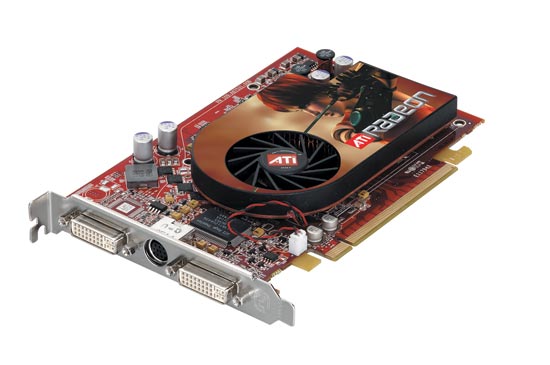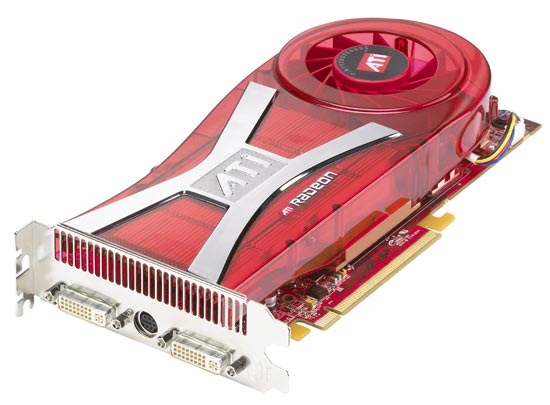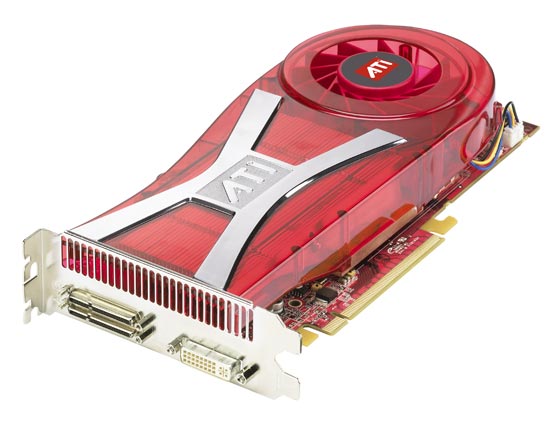ATI's New High End and Mid Range: Radeon X1950 XTX & X1900 XT 256MB
by Derek Wilson on August 23, 2006 9:52 AM EST- Posted in
- GPUs
ATI has this nasty habit of introducing way too many GPUs into its lineup, and today is no letdown to tradition as ATI is introducing a total of five new video cards.
We'll start at the bottom with the Radeon X1300 XT, a new $89 part from ATI. The X1300 XT is effectively a rebadged X1600 Pro, and thus should offer a significant performance boost over the rest of the X1300 family.
Since the X1300 XT is the same thing as an X1600 Pro, the X1600 family gets a new member with the introduction of the X1650 Pro. The X1650 Pro is identical to the X1600 XT except for a 10MHz increase in core clock and memory clock frequency. Yes, an entirely new product was created out of a 10MHz bump in GPU/memory clocks. The X1650 Pro will be priced at $99.

ATI's Radeon X1650 Pro
Last week we took a look at currently available mid-range GPU solutions in the $200 - $300 price range and found that for around $340 you could pick up a 512MB X1900 XT and generally get some very solid performance. Today ATI is introducing a 256MB version of the X1900 XT at the suggested retail price of $279, which has the potential to give ATI a firm grasp on the performance mainstream GPU market. The X1900 XT 256MB is no different than its 512MB brother other than memory size, so pipes and clocks are the same. If you're wondering why the X1900 XT (512MB) noticed such a sharp decline in price over the past couple of weeks, the impending release of the cheaper 256MB version is your answer.
At the high end we've got the final two cards that round out today's launch: ATI's Radeon X1950 XTX and X1950 CrossFire. The X1950 XTX is identical to the X1900 XTX except that it uses faster GDDR4 memory, running at 1GHz compared to 775MHz on the X1900 XTX. With more memory bandwidth, the X1950 XTX could outperform its predecessor, but performance isn't what we're mostly excited about with this card - it's the price. ATI is hoping to sell the X1950 XTX for $449, a drop in price compared to the introductory price of the X1900 XTX, which is a trend we haven't seen too often among GPU makers.

ATI's Radeon X1950 XTX
To make things even better, the CrossFire version, which has identical clocks, is also priced at $449; in other words, there's no reason not to get the CrossFire version. ATI confirmed to us that you can run a pair of X1950 CrossFire cards in CrossFire mode, further reinforcing the fact that there's no reason to even buy the regular card. You get the same performance, same features and better flexibility with the CrossFire card so why not?

ATI's Radeon X1950 CrossFire
| NVIDIA Graphics Card Specifications | ||||||||
Vert Pipes |
Pixel Pipes |
Raster Pipes |
Core Clock |
Mem Clock |
Mem Size (MB) |
Mem Bus (bits) |
Price |
|
| GeForce 7950 GX2 | 8x2 |
24x2 |
16x2 |
500x2 |
600x2 |
512x2 |
256x2 |
$600 |
| GeForce 7900 GTX | 8 |
24 |
16 |
650 |
800 |
512 |
256 |
$450 |
| GeForce 7900 GT | 8 |
24 |
16 |
450 |
660 |
256 |
256 |
$280 |
| GeForce 7600 GT | 5 |
12 |
8 |
560 |
700 |
256 |
128 |
$160 |
| GeForce 7600 GS | 5 |
12 |
8 |
400 |
400 |
256 |
128 |
$120 |
| GeForce 7300 GT | 4 |
8 |
2 |
350 |
667 |
128 |
128 |
$100 |
| GeForce 7300 GS | 3 |
4 |
2 |
550 |
400 |
128 |
64 |
$65 |
| ATI Graphics Card Specifications | ||||||||
Vert Pipes |
Pixel Pipes |
Raster Pipes |
Core Clock |
Mem Clock |
Mem Size (MB) |
Mem Bus (bits) |
Price |
|
| Radeon X1950 XTX | 8 |
48 |
16 |
650 |
1000 |
512 |
256 |
$450 |
| Radeon X1900 XTX | 8 |
48 |
16 |
650 |
775 |
512 |
256 |
$375 |
| Radeon X1900 XT | 8 |
48 |
16 |
625 |
725 |
256/512 |
256 |
$280/$350 |
| Radeon X1900 GT | 8 |
36 |
12 |
525 |
600 |
256 |
256 |
$230 |
| Radeon X1650 Pro | 5 |
12 |
4 |
600 |
700 |
256 |
128 |
$99 |
| Radeon X1600 XT | 5 |
12 |
4 |
590 |
690 |
256 |
128 |
$150 |
| Radeon X1600 Pro | 5 |
12 |
4 |
500 |
400 |
256 |
128 |
$100 |
| Radeon X1300 XT | 5 |
12 |
4 |
500 |
400 |
256 |
128 |
$89 |
| Radeon X1300 Pro | 2 |
4 |
4 |
450 |
250 |
256 |
128 |
$79 |
Today we're able to bring you a look at performance of the mid range and high end solutions, the X1950 cards and 256MB X1900 XT. We're still waiting for ATI to send us our X1300 XT and X1650 Pro samples, and we will follow up in the coming weeks with a look at the performance of those offerings as well. Note that although ATI is lifting the veil on its five new products today, you won't actually be able to buy any of them until September 4th (on the high end) with no real availability until the 14th. Given the pricing that ATI is promising however, these cards are worth waiting for.
With five new cards being introduced, ATI is hoping to slowly phase out all of its other offerings to simplify its product lineup. Unfortunately, it will take some time for all inventory to dry up, but when it does ATI hopes to have the following cards in its lineup:
| Class | Card | Price |
| Enthusiast | ATI Radeon X1950 XTX | $449 |
| ATI Radeon X1900 XT 256MB | $279 |
|
| Performance | ATI Radeon X1900 GT | $249 |
| Mainstream | ATI Radeno X1650 Pro | $99 |
| ATI Radeon X1300 XT | $89 |
|
| Value | ATI Radeon X1300 Pro | $79 |
| ATI Radeon X1300 256 | $59 |
|
| ATI Radeon X1300 64-bit | $49 |
The performance difference between the X1900 XTX and XT was small enough that it didn't make sense to have two different products, which is why ATI left the X1950 XTX as the only high end GPU on its roster.
As we don't have availability right now, we can't confirm real street prices, but we did speak with a few companies who manufacture ATI cards. HIS has stated that they should be able to meet ATI's pricing on all of these parts, which is promising. We also heard from PowerColor on pricing, and it looks like they will be able to meet the MSRP price on the X1950 XTX. With the X1900 XT and X1900 XT 256MB, PowerColor will be listing them for $400 and $300 respectively. Depending on how the rest of the manufacturers stack up, we could see some good prices next month or be sorely disappointed; at this point it's best to be cautious with a launch so far in advance of availability.










74 Comments
View All Comments
Vigile - Wednesday, August 23, 2006 - link
My thought exactly on this one Anand...Anand Lal Shimpi - Wednesday, August 23, 2006 - link
You can run dual monitors with a CrossFire card as well, the CrossFire dongle that comes with the card has your 2nd DVI output on it :)Take care,
Anand
kneecap - Wednesday, August 23, 2006 - link
What about VIVO? The Crossfire Edition does not support that.JarredWalton - Wednesday, August 23, 2006 - link
For high-end video out, the DVI port is generally more useful anyway. It's also required if you want to hook up to a display using HDCP - I think that will work with a DVI-to-HDMI adapter, but maybe not? S-VIDEO and Composite out are basically becoming seldom used items in my experience, though the loss of component out is a bit more of a concern.JNo - Thursday, August 24, 2006 - link
So if I use DVI out and attach a DVI to HDMI adaptor before attaching to a projector or HDTV, will I get a properly encrypted signal to fully display future blu-ray/hd-dvd encrypted content?The loss of component is a bit of a concern as many HDTVs and projectors still produce amazing images with component and, in fact, I gather that some very high resolutions+refresh rates are possible on component but not DVI due to certain bandwidth limitations with DVI. But please correct me if I am wrong. I take Anandtech's point on the crossfire card offering more but with a couple of admittedly small quesiton marks, I see no reason not to get the standard card and crossfire for the second later if you decided to go that route...
JarredWalton - Thursday, August 24, 2006 - link
I suppose theoretically component could run higher resolutions than DVI, with dual-link being required for 2048x1536 and higher. Not sure what displays support such resolutions with component inputs, though. Even 1080p can run off of single-link DVI.I think the idea with CF cards over standard is that they will have a higher resale value if you want to get rid of them in the future, and they are also more versatile -- TV out capability being the one exception. There are going to be a lot of people that get systems with a standard X1950 card, so if they want to upgrade to CrossFire in the future they will need to buy the CrossFire edition. We all know that at some point ATI is no longer going to make any of the R5xx cards, so if people wait to upgrade to CrossFire they might be forced to look for used cards in a year or two.
Obviously, this whole scenario falls apart if street prices on CrossFire edition cards end up being higher than the regular cards. Given the supply/demand economics involved, that wouldn't be too surprising, but of course we won't know for another three or four weeks.
UNESC0 - Wednesday, August 23, 2006 - link
thanks for clearing that up Anand, news to me!TigerFlash - Wednesday, August 23, 2006 - link
I was wondering if anyone thinks it's wise to get an intel core duo 2 motherboard with crossfire support now that AMD is buying out ATI. Do you think ATI would stop supporting Intel motherboards?johnsonx - Wednesday, August 23, 2006 - link
Of course not. AMD/ATI isn't stupid. Even if their cross-licensing agreement with Intel didn't prevent them from blocking Crossfire on Intel boards (which it almost surely does), cutting out that part of the market would be foolish.
dderidex - Wednesday, August 23, 2006 - link
What's with the $99 -> $249 gap?Weren't we supposed to see an X1650XT, too? Based on RV570? ...or RV560? Something?